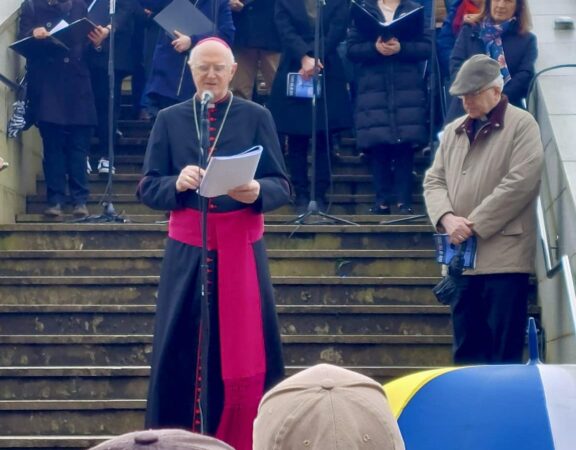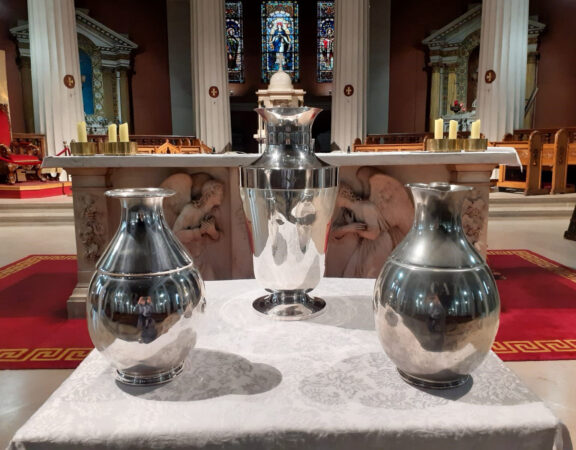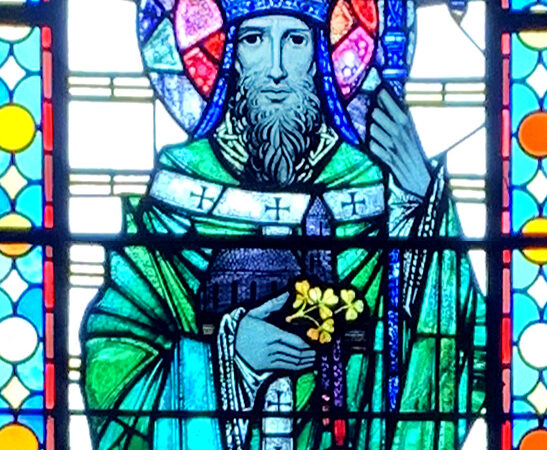CHRISTMAS MIDNIGHT MASS 2008
Homily notes and Message of
Most Rev. Diarmuid Martin
Archbishop of Dublin, Primate of Ireland
—————-
Pro-Cathedral, Dublin 24th December 2008
Most Rev. Diarmuid Martin
Archbishop of Dublin, Primate of Ireland
—————-
Pro-Cathedral, Dublin 24th December 2008
“Do not be afraid… Today in the town of David a saviour has been born, he is Christ the Lord”
The Feast of Christmas is about the birth of a Saviour. It is about the breaking into the realities of the world of that moment and into the world of our own time of the loving kindness of God who comes to save, to free, and to remove from us a sense of fear.
And yet on many occasions people have been tempted to present the Christian faith as a faith inspired by fear and have even attempted to use fear as a supposed method to spread the Christian faith. As a result, many lives have been damaged through being possessed by fear and scruples, by tension and anxiety. Nothing could be farther from the essence of the Christian faith: belief in Jesus Christ is belief in one who saves. It is a faith which brings freedom.
The saviour came to free us. Everywhere in the Gospel where the Good News was preached, contemporaneously people were healed and their burdens were lifted. The saviour tonight appears in our midst to lift from our hearts the bonds of fear and to bring a true sense of peace into our hearts, into our families and into our world. We cannot leave this celebration of the birth of Jesus without being touched by the salvation that that birth brought with it.
Because belief in Jesus Christ has not been presented as a faith which frees, many people over the years have been tempted and lured by false visions of freedom and of liberation, some political, some ideological, some even pseudo-religious, some such as the path of consumerism which lead to emptiness and thus even more anxiety. Fundamentally freedom comes when we accept the love that God offers to us, when we become loving persons and when we share that love with those around us, those who are near to us and those who are our brothers and sisters anywhere in the world.
The Gospel reading about the birth of Jesus is one with which we are all familiar, but it is a complex reading with a number of different dimensions. In this Holy Night let us look at just two.
The Gospel reading about the birth of Jesus is one with which we are all familiar, but it is a complex reading with a number of different dimensions. In this Holy Night let us look at just two.
In the first place, the Gospel we have heard goes out of the way to remind successive generations that the birth of Jesus is not a myth but a real event which took place within the real world, within real history. The birth of Jesus is a historical fact which took place at a specific moment in history. We are given historical facts about the leaders of the Empire in Rome and the local governor and what were the events of the day, especially the census.
The Saviour came to a real concrete world at a particular historical moment, just as the Saviour comes to us today and his message of love and salvation has to reach not just our own heart and emotions, but be brought to the concreteness of our world, with its recession, with its injustices, exploitation and abuses; with the selfishness which has created a rift between rich and poor, in which knowledge is hoarded for profit when it could be used to fight poverty and disease, with our environment threatened by a lack of sensitivity to the integrity of God’s creation. The Gospel of this night reminds us that the Saviour comes to the real world and with the coming of the Word made flesh the real world never remains the same again.
And a second dimension of the Gospel reading. The Gospel reading indicates who the powerful of the world were at the time of Jesus. Those who use their power for the own interest have always been present in the history of the real world. But Jesus appears in a different context. God does not choose the powerful for “his” history. “There is no room in the inn”, we are told. The saviour appears not alongside the powerful, but alongside the many for whom there is no place in society, in the society of then and of today.
The birth of Jesus brings redemption and salvation and freedom to those who do not experience the hospitality of welcome which is so often enjoyed by the mainstream. The Saviour comes among those who are struggling to survive, in the face of all the exclusions which are the fruit of our being continually trapped by the subtle temptation to maintain our own comfort, especially the comfort of letting things stay as they are rather than rocking the boat of our own prejudices.
Freedom will never be attained by not rocking the boat of our own superficialities. Freedom costs. Freedom means not just being free to do our own thing; it means first of all freeing ourselves, or more accurately allowing ourselves to be freed from those things which entrap us and which lead us to false comfort. To understand Jesus we have to remove ourselves from any sort of superficial conformism and have the courage to allow our hearts to be taken over by a new perspective about the meaning of what is important.
Jesus is welcomed not in the palaces nor much less in the hearts of the establishment but by a handful of shepherds who are out with their sheep in the cold of night, trying to earn a hard living, away from their family and very distant from all the centres of power. Jesus appears in the world in humility and he will only be recognised by the humble. And yet the temptation always remains to use the Church and the message of Jesus to exercise power or even worse to abuse power.
Jesus is welcomed not in the palaces nor much less in the hearts of the establishment but by a handful of shepherds who are out with their sheep in the cold of night, trying to earn a hard living, away from their family and very distant from all the centres of power. Jesus appears in the world in humility and he will only be recognised by the humble. And yet the temptation always remains to use the Church and the message of Jesus to exercise power or even worse to abuse power.
Jesus appears in a manner which the respectable and the powerful and indeed many of those who would have considered themselves as “ordinary” believers could never have imagined. They had their own expectation about what the Saviour should be like and what the Saviour should do.
Indeed all of us would in many ways prefer a Jesus of our own making, a Jesus who fits in comfortably with our own cosy values. We do not want a Saviour who intrudes. Almost without knowing it we keep Jesus outside the “inn” of our hearts. Some of us still think we can find God in the comfort of conformism, others in pseudo-religious signs and prodigies, and some simply in the emotion of the moment. The story of the birth of Jesus is a beautiful one, it is a moving one, but it is far from being just a nice fairy-tale; it is the invitation of a demanding path of life.
This same mystery of the humility of Jesus’ birth becomes also the mystery of his life. Jesus, who is God, does not claim any privilege which would belong to God but gives himself in love even until death. He becomes poor for us. This is not an adulation of poverty. There is indeed harsh poverty, so harsh that it degrades people. There is a poverty of marginalization where people are not allowed to realise their potential to the full. There is a spiritual poverty of emptiness.
But there is also the poverty of the Gospel, not a poverty of deprivation but one which frees. It is a poverty of being free from attachment, free to love, free to care, free to give of ourselves and to give ourselves, and to transform the world. We can begin that transformation through love in our own homes, with our spouses and our children. The magic of Christmas can transform human relationships, heal old wounds and forgive hurts and open a new future of care and respect.
But there is also the poverty of the Gospel, not a poverty of deprivation but one which frees. It is a poverty of being free from attachment, free to love, free to care, free to give of ourselves and to give ourselves, and to transform the world. We can begin that transformation through love in our own homes, with our spouses and our children. The magic of Christmas can transform human relationships, heal old wounds and forgive hurts and open a new future of care and respect.
The world can be transformed by following the example of Mary, the young Mother of Jesus, who maintains in her understandable personal bewilderment a true sense of simple dignity and integrity. Through her opening herself to Jesus through her “yes”, the light of the world, the Son of God enters directly into our human history. May this feast encourage all of us to open our hearts to the loving kindness of God and let that love transform us and our world, take away our fears, fill us with the unique joy of the feast and liberate us to share that joy with others.
“Do not be afraid… Today in the town of David a saviour has been born, he is Christ the Lord
”









